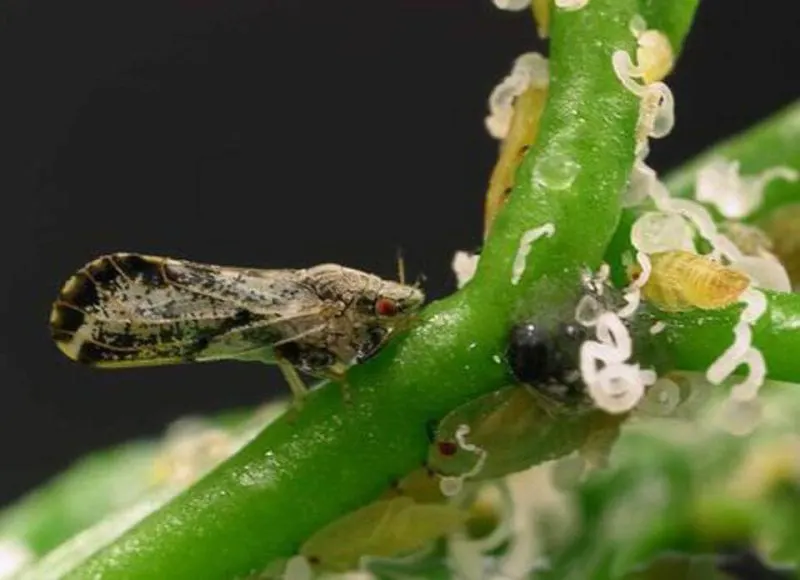Gene editing poised to save Florida’s citrus crop from greening disease spread by invasive insect
Gene editing poised to save Florida’s citrus crop from greening disease spread by invasive insect


In 2003 and 2004, citrus yields were the highest in Florida history, at almost 300 million boxes, more than any other state, including California.
“There was so much fruit they couldn’t sell it all — it was too much,” said Michael Rogers, director and professor at the Citrus Research & Education Center of the University of Florida’s Institute of Food & Agricultural Sciences in Lake Alfred, who arrived as a young field researcher with a Ph.D. the same year.
That was also when the Asian citrus psyllid arrived in the United States, an insect first detected in Asian citrus trees a century earlier. Nobody knew much about it in 2004 and 2005, recalls Rogers, who was 26 years old then, or about the bacteria it spreads that results in Huanglongbing or so-called citrus greening. Greening has devastated the Florida industry in the last two decades.
Now they know a lot more about it, and Rogers is 46. Research is no longer “a shotgun approach trying anything somebody thinks could help,” explains Rogers, “but almost laser-focused on things that show promise.”
Gene editing, for example.
“Genetic improvement of citrus through gene editing means we can identify a gene of interest and turn it off. So you lose those disease response systems — it won’t respond to (the greening) bacteria,” explains Rogers.
“But are there negative effects? What else can’t they respond to? So we have field tests of gene-edited plants, and funding is now spent on things that have a high likelihood of succeeding. And if they do succeed, it will pay off tremendously for the industry. We don’t yet know if it will work.”
This is an excerpt. Read the original post here

 | Videos | More... |

Video: Nuclear energy will destroy us? Global warming is an existential threat? Chemicals are massacring bees? Donate to the Green Industrial Complex!
 | Bees & Pollinators | More... |

GLP podcast: Science journalism is a mess. Here’s how to fix it

Mosquito massacre: Can we safely tackle malaria with a CRISPR gene drive?

Are we facing an ‘Insect Apocalypse’ caused by ‘intensive, industrial’ farming and agricultural chemicals? The media say yes; Science says ‘no’
 | Infographics | More... |

Infographic: Global regulatory and health research agencies on whether glyphosate causes cancer
 | GMO FAQs | More... |

Why is there controversy over GMO foods but not GMO drugs?

How are GMOs labeled around the world?

How does genetic engineering differ from conventional breeding?
 | GLP Profiles | More... |

Alex Jones: Right-wing conspiracy theorist stokes fear of GMOs, pesticides to sell ‘health supplements’




 Viewpoint — Fact checking MAHA mythmakers: How wellness influencers and RFK, Jr. undermine American science and health
Viewpoint — Fact checking MAHA mythmakers: How wellness influencers and RFK, Jr. undermine American science and health Viewpoint: Video — Big Solar is gobbling up productive agricultural land and hurting farmers yet providing little energy or sustainabilty gains
Viewpoint: Video — Big Solar is gobbling up productive agricultural land and hurting farmers yet providing little energy or sustainabilty gains Fighting deforestation with CO2: Biotechnology breakthrough creates sustainable palm oil alternative for cosmetics
Fighting deforestation with CO2: Biotechnology breakthrough creates sustainable palm oil alternative for cosmetics Trust issues: What happens when therapists use ChatGPT?
Trust issues: What happens when therapists use ChatGPT? 30-year-old tomato line shows genetic resistance to devastating virus
30-year-old tomato line shows genetic resistance to devastating virus California, Washington, Oregon forge immunization alliance to safeguard vaccine access against federal undermining
California, Washington, Oregon forge immunization alliance to safeguard vaccine access against federal undermining The free-range chicken dilemma: Better for birds, but with substantial costs
The free-range chicken dilemma: Better for birds, but with substantial costs ‘You have to treat the brain first’: Rethinking chronic pain with Sanjay Gupta
‘You have to treat the brain first’: Rethinking chronic pain with Sanjay Gupta
